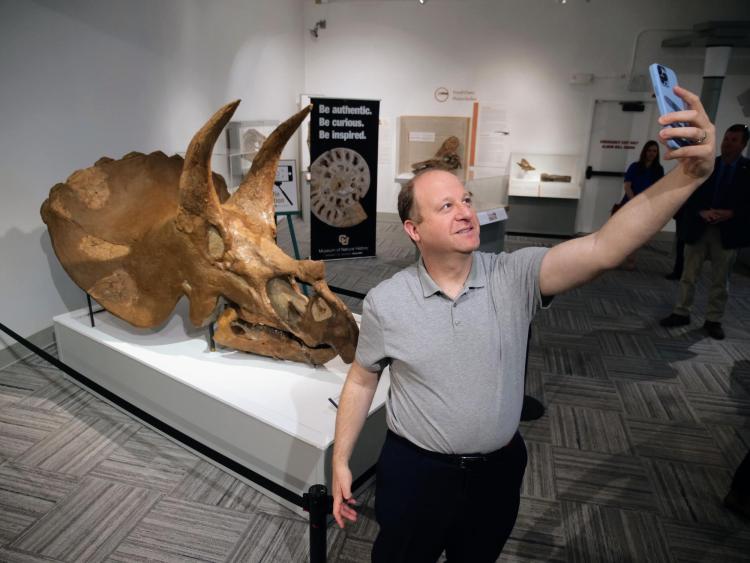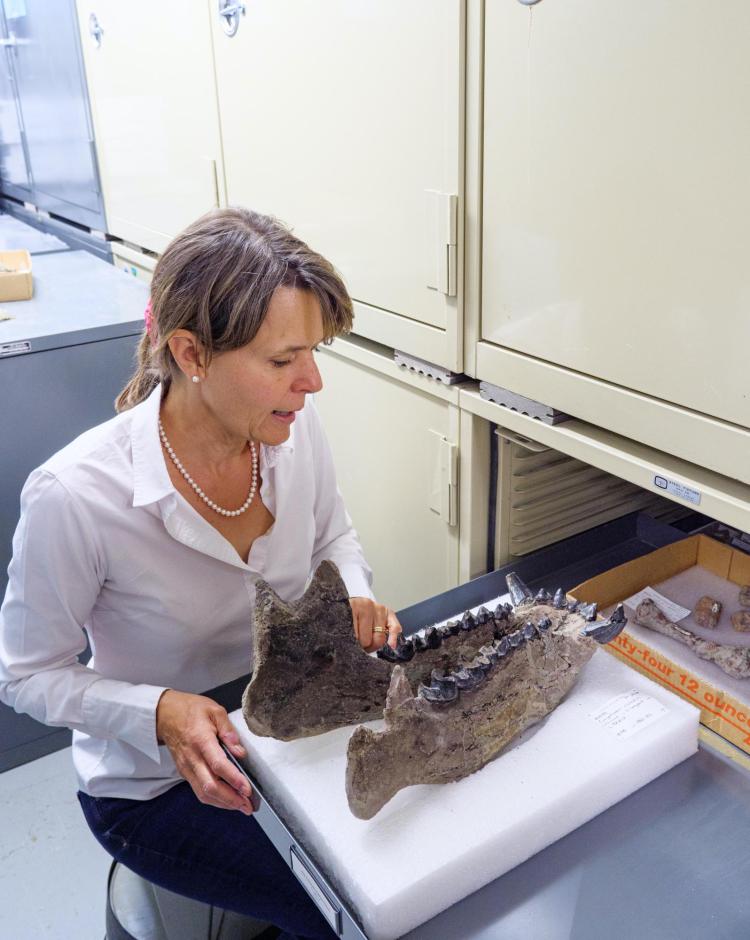CU Boulder’s beloved Triceratops returning home to Smithsonian
Banner image: In early 2020, a team collected a detailed 3D scan of a Triceratops skull on the CU Boulder campus. (Credit: Glenn Asakawa/CU Boulder)
Next month, CU Boulder will say goodbye to a beloved member of the campus community—this one has three horns, a wide frill like a fan and was dug up from the ground in Wyoming in 1891.
If you go
Who: Free and open to the public
What:Triceratops in Paleontology Hall
When: Monday-Sunday until May 8
Where:CU Museum of Natural History
That resident is, of course, the fossil skull of a Triceratops dinosaur that has sat on display at the CU Museum of Natural History for decades. On May 9, a team from the Smithsonian Institution, which loaned the skull to CU Boulder in 1981, will begin the painstaking process of disassembling the Triceratops—in preparation for shipping it back to the National Mall.
“It’s going to a good place: home,” said Jaelyn Eberle, curator of fossil vertebrates for the CU Museum.
Visitors who want to say one last farewell can visit the Triceratops for free at the museum until May 8.
The skull is an important part of the history of the American West, Eberle said. It was part of an epoch of paleontology called the “Bone Wars” and also connects Colorado to its past 66 million years ago—when Tyrannosaurus rex stalked the landscape, and herbivores like Triceratops munched on palm fronds and other prehistoric plants.
[video:https://youtu.be/63Y5VtoM4Gc]
While regular museum visitors may miss seeing the Smart car-sized specimen, Eberle said that the move is a positive one: At the Smithsonian, scientists from around the world will be able to study the skull in greater-than-ever detail, potentially even answering some big mysteries about Triceratops. Scientists, for example, are still debating how Triceratops used their horns and frill.Museum staff haven’t yet decided what will take the place of the Triceratops when it departs in May.
“Just the other day I saw a little kid, probably in preschool, walk up to that dinosaur and her mouth just fell open,” Eberle said. “Even though we’ve had it since the 1980s, I don’t think it has ceased to excite people. At the same time, now we have the chance to share something new with visitors, and I think that’s equally exciting.”
Bone wars
Kenneth Carpenter was an undergraduate student in the early 1980s when he helped to drive the specimen to Colorado in a flat-bed truck. Most of the skull came assembled, but Carpenter put together pieces of the frill in the museum’s Paleontology Hall using a steel bar, mesh and plaster of Paris.
“I was doing all this work as a work-study student,” said Carpenter who acknowledged that the effort distracted him from his classes.
Carpenter, who earned his doctorate in geological sciences from CU Boulder in 1996, added that Triceratops fossils were a player in one of the most famous epochs in the history of paleontology.
In the late 1800s, scientists Othniel Marsh and Edward Cope were in the middle of a long-running feud—with each man racing to name as many new fossil animal species as he could, and bash his rival in the press. Marsh himself inspected the 1891 skull from Wyoming. He decided it belonged to a brand-new species, which he named Triceratops calicornis.
In this case, Marsh’s eagerness to name new species may have gotten the better of him. Scientists no longer recognize Triceratops calicornis as its own species, but instead lump it in with Triceratops horridus, which Marsh had also named years earlier.
Despite the skull’s back-and-forth history, the fossil remains what paleontologists call a “holotype”—or a scientific specimen that defines an entire species.
“It’s the gold standard for a species,” Carpenter said.
Colorado’s past
The fact that it’s a holotype is why CU Boulder’s own Triceratops is heading back to Washington D.C.—museums rarely lend out holotype specimens for long periods anymore.
Eberle, who joined CU Boulder in 2002, is sad to see it go. She has fond memories of bringing her oldest son, now 22, to the Paleo Hall when he was a child.
“He grew up in the museum,” she said.
But there are plenty of other ancient wonders in the museum. Currently, the CU Museum holds nearly 5 million specimens in its collections, including more than 100,000 vertebrate fossils—from giant marine predatory reptiles called mosasaurs to ancient ungulates that evolved after the extinction of the dinosaurs.
One of her own favorites is the skull of a Megacerops, which sits on display next to the Triceratops. These extinct relatives of today’s rhinoceroses grew to the size of elephants and traveled in herds across Colorado and other western states roughly 34 to 38 million years ago.
“We have plenty of possibilities that would also help to show the public what lived in Colorado and the Rocky Mountain region millions of years ago,” Eberle said.
Patrick Kociolek, director of the CU Museum of Natural History, is excited for the possibilities.
“Nearly one million visitors have seen that Triceratops in the Henderson building. That deep knowledge and research excellence is still present at the museum today,” he said. “Driven by our mission to share extraordinary objects and specimens, and the knowledge gained about them in scientific research and study, we continue to present the natural world, for free, at the museum, as well as virtually.”




